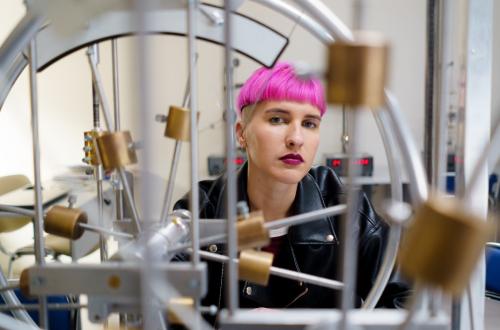Jessica Graber reflects on the importance of the 2024 Conference for Undergraduate Women in Physics

May 14, 2024
From January 19 to 21, Tulane University hosted a https://www.aps.org/programs/women/cuwip/agenda.cfmhttps://www.aps.org/programs/women/cuwip/agenda.cfm (CUWiP), an American Physical Society event.
CUWiP is a three-day regional conference designed to empower undergraduate women in physics by hosting professional opportunities such as networking events, conferences, and panels.
Tulane was one of 14 regional sites throughout the United States and Canada to host the 2024 CUWiP, drawing in attendees from a variety of states including Texas, Oklahoma, and Mississippi.
Jessica Graber, a senior professor of practice at Tulane, applied to host the conference at Tulane and received a $10,000 Faculty Initiative Grant from Newcomb Institute along with additional funding from the American Physical Society, Tulane’s School of Science and Engineering (SES), and the Physics and Engineering Department of SES.
“Tulane has some really great resources. Our workshops were led by several people from the Tulane Library Department of Scholarly Engagement, the Office of Accessibility, and the Office of Student Success. The Office of Career Services planned our career fair for us,” Graber said.
The conference is free to attend, and registration fees can be waived if necessary. Applications are generally due in late October of every year. Applicants who are accepted to the program will be assigned to a regional site at which they will attend the conference.
“It is designed to introduce students to what a real academic conference is like so that they don’t feel intimidated to navigate one. We had workshops on career advice, time management, how to find summer research opportunities, how grants and other funding work, coding, and more,” Graber said.
Participants at the 2024 CUWiP had the chance to attend panels hosted by renowned scholars such as Dr. Saundra McGuire, Jocelyn Bell Burnell, Kimberly Foster, and Dr. Gabriela González.
“Many students say the most important thing was just being around so many other women in physics programs. Many students come from small schools where they may be the only woman or gender minority in their program, and they may have to deal with bias and imposter syndrome completely on their own,” Graber said.
Graber is grateful to the students who helped her make the conference happen at Tulane this year. “I’d like to give credit to my student committee who did a lot of the agenda planning work, and all the website work—Aubrey Augustine, Kendall Jarvis, Lanie McLeod, and Sawyer Liner.”
